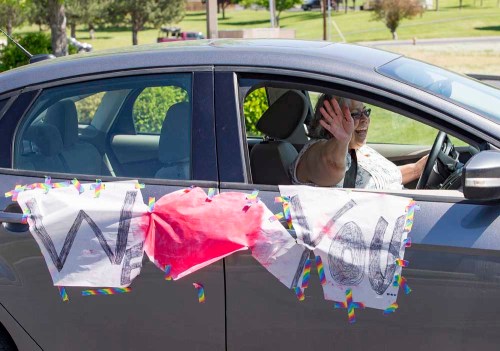Seniors deal with too much solitude during COVID-19
Published 6:00 am Tuesday, May 26, 2020

- A visitors waves from her car to residents of Suttle Care and Retirement in Pendleton on May 1, 2020.
PENDLETON — In the midst of a coronavirus pandemic, the residents of Suttle Care & Retirement radiated joy.
They haven’t had visitors at the assisted living facility since the governor’s executive order on March 10 barring visitation in an effort to temper the spread of COVID-19. On this day, however, family members and friends cruised by slowly in vehicles, waving, honking and shouting “I love you” to the residents.
Six female residents wearing bright hats sat in chairs next to the curb, sipping strawberry lemonade and eating orange sherbet. An elderly man sporting a sombrero sat in the shaded entryway grinning at the cacophony. A remote-controlled race car operated by Suttle Care co-owner Tracy Suttle whizzed to and from whenever there was a lull in the parade of admirers.
The residents beamed and waved as a woman driving a Ford Focus pulled into view. A sign fastened to the car said, “I heart you.” The driver honked. Behind her came a motorcyclist wearing a face mask with a floral design. He beeped his horn. Next came a pickup truck. The residents laughed as a little dog stuck his head out a window.
The residents leaned into the love. They bantered back and forth and displayed signs. One said, “I miss you.” Another said simply, “Call me.”
Such parades are one way to fight the isolation and loneliness of physical distancing required to reduce transmission of the coronavirus. Loneliness is an issue for thousands of older Americans living alone in their homes or cut off from family at senior living facilities during this time.
Calls to the Senior Loneliness Line, which is operated by Portland-based Lines for Life and funded by Clackamas County, increased so much in the past couple of months that the organization went statewide with the line a few weeks ago.
“We put it out there and it blew up,” said Greg Borders, chief clinical officer of Lines for Life. “It’s just intuitive as to why that line is needed right now. It just makes sense. Seniors are feeling isolated and lonely. They’re reaching out.”
Matt Henry, of Pendleton, has more solitude than he wants since the pandemic ramped up. The retired Methodist minister has lived alone since his wife, Amy Pearson, moved recently to the memory care unit at Juniper House because of her Alzheimer’s disease. Since Gov. Kate Brown announced that group care facilities would no longer allow visitors, he can no longer visit Amy in the conventional way. Instead, they converse through a window, each of them straining to hear the other through the glass.
On Friday, May 8, Henry leaned close to Pearson’s window and smiled at his wife. The window was pushed up a few inches.
“Hi, hon,” he said in a loud voice. “You look good. I love you so much. I miss you.”
As he walked back to his car after the visit, he looked downcast. He usually tears up on the way back to the car.
“It’s extremely confusing for her,” Henry said. “It’s brutal.”
Amy, who also served in the clergy, was diagnosed with early-onset Alzheimer’s in 2015 at age 56. Henry misses her intensely.
“She’s so kind and compassionate, sweet and funny,” he said. “Brilliant, too. At least she was. She graduated at the top of her class in seminary.”
In many ways, Amy has already left him, but not being able to visit normally still takes its toll.
“I miss her, COVID or no, there’s nothing that could change that,” he said. “COVID just accentuates that tremendously.”
Henry doesn’t mind a little alone time but he has limits. In normal times, he sings with the Pendleton Men’s Chorus and maintains a good social life. He beats back pandemic-induced loneliness by taking physically distanced walks with friends, and gardening. He regularly heads out to the yard where he has transformed a weedy strip of dirt into a viable garden. He filled pots on his deck with basil, chili peppers, chard and cherry tomatoes. He knows he isn’t the only one who finds solace in the soil.
“I think most people are getting through this by getting outside and getting into the garden,” he said. “If my wife were at home and in her right mind, this would be an entirely different thing.”
At Suttle Care, activity director Humberto Bonilla works hard to keep the residents from feeling lonely. Since they can’t have visitors, he gives them a steady diet of games and music. He puts crossword puzzles on a big screen and they do them as a group. He takes them on drives. A few weeks ago, they drove out on Mission Road to look at wheat fields and livestock.
“They get lonely being cooped up,” Bonilla said. “It’s good to get them out.”
Bonilla watched the delighted residents with a grin.
“This is good for them,” he said. “Keeps them from going stir crazy.”
Seniors living alone in their own homes without the benefit of activity directors are even more isolated.
“The nature of being human means we need contact with each other,” Henry said. “This social isolation is extremely deleterious to our mental health. Who knows what the ramifications of all of this will ultimately be.”









